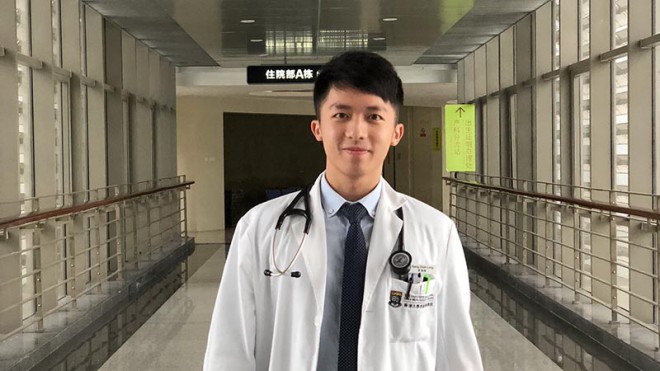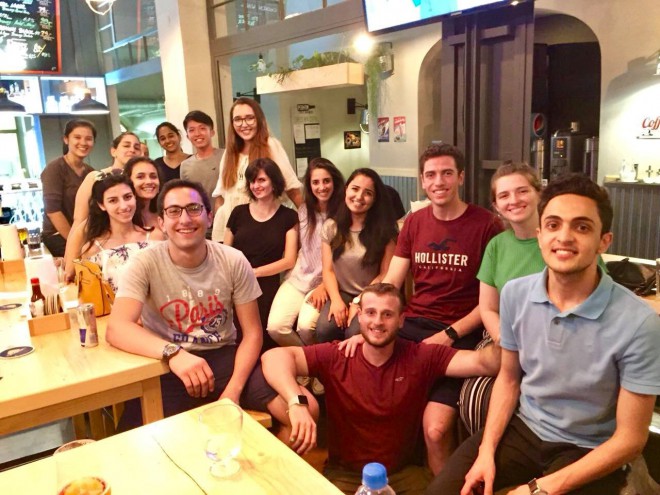 Sunny Tsang is a medical student at the University of Hong Kong, in the summer of 2018 he spent his internship at the Second Faculty of Medicine and Motol University Hospital. He writes a reflection on his experience.
Sunny Tsang is a medical student at the University of Hong Kong, in the summer of 2018 he spent his internship at the Second Faculty of Medicine and Motol University Hospital. He writes a reflection on his experience.
My clerkship in Motol University Hospital is an unforgettable experience packed fully with surprises and unexpected gains.
The experience has truly broadened by medical knowledge and motivated me to learn. I came across a spectrum of congenital heart diseases, understand their presentations, pathophysiology, investigations, managements and follow ups.
I have seen patients suffering from common cyanotic heart diseases like truncus arteriosus, transposition of great arteries, tricuspid atresia and tetralogy of Fallot, to common obstructive diseases such as hypoplastic left heart syndrome and coarctation of aorta. I have also seen and learnt some rarer diseases like patent ductus arteriosus and complications of ventricular septal defects like Eisenmenger's syndrome. I was also so fortunate to observe a variety of operations, ranging from valvular replacement surgery to cone repair of Ebstein's Anomaly (apical displacement of tricuspid valve) and heart transplantation. I also gained the opportunity to shadow ICU doctors, where I saw their daily routine, from regular examinations of the patients to admission of new patients. In the cardiology rotation, not only did I go to out-patient clinics, I have also seen treatments in catheterization laboratory, for example, occlusion of ASD and stenting of coarctation of aorta. I have also observed radiofrequency ablation in treatment of Wolff-Parkinson-White syndrome (accessory electrical signal). All the diseases and treatments seem new to me, as a preclinical student. I made notes and spent plenty of time studying them after encountering them.
Other than harvesting great knowledge, I have also horned my clinical skills. I got the opportunity to auscultate the patients. I have learnt and have a brief concept on how to distinguish different murmurs according to different pathological etiologies, from systolic murmur to diastolic murmur, from continuous to ejection click. Other than that, I am also so thankful that doctors were so patient and kind to teach me how to perform and read echocardiogram, which is a common imaging modality in children but not adults. I can now identify the basic anatomy and pathologies from the echocardiogram. I would like to thank the doctors for taking care of me and teaching me so many new skills, which aids in me in my journey in medicine.
I have gained a great deal of hard skills during the program, but what impressed and impacted me more is the soft skills which I was subtly instilled. To be more explicit, it is the doctors' attitude and personalities at work which made me reflect on what kind of doctor I would like to be in the future.
Being patient and willing to explain more and more to patients can yield the deepest satisfaction and the best doctor-patient relationship. Before participating in the program, I expected doctors would be mostly busy and rush in the hospitals, However, to my surprise, the doctors here has far less workload than Hong Kong's doctors. The medical doctors usually have two to three patients a day and the surgeons usually have one operation per day. In the specialist outpatient clinic, the doctors have plenty of time dealing with patients. I can see no rush in the documentation, physical examinations and other investigations. Though I cannot understand the language, I can see the doctors educating and explaining to the parent the children’s conditions, with models and drawings, with comprehensive questions and answers. As all the parents' concern and puzzles are resolved, the consultation room is always filled with joy and satisfaction. I completely understand that Hong Kong's working conditions have a stark contrast compared to Czech. Doctors are bombarded and occupied with heavy workload and substantial amount of patients. However, I do think the attitude of Czech doctors can be adopted and we can try our very best to relieve patients' concerns, ensuring the patients leave the consultation room with less stress and anxiety, with more relief and understandings. I shall always remind myself what I am doing in the future is caring people but not dealing with cases, what I am obligated to is a doctor-patient relationship but not a job in the hospital, what I ought to invest more is time and patience but not convenience and afterwork enjoyment.
‘Be like water,’ as Bruce Lee said long ago. A good and competent doctor does have the quality of water. Like water can transform itself and fit in any container, doctors can transform their knowledge and be flexible and design unique solutions to different problems. In preclinical years, we have been learning standardised anatomy and pathologies, where we have stiff concepts in basic medical knowledge. Out of my expectation, there are so many variations in different patients. Like in the same congenital heart disease, two patients can have two similar but different locations of defect. And a competent and experienced doctor needs to be decisive and flexible when dealing different conditions. Like what I saw in the treatment of hypoplastic left heart syndrome, what I learnt from the textbook is the three-stage surgeries. However, the doctor told me in real life, sometimes two-stage surgeries can be adopted, and it is not a must to make the exact connections as in the text book. And in the operation on a baby with Ebstein's syndrome, the surgeon had two plans in mind and finally decided to adopt the cone repair upon opening the heart. ‘The approaches may be different but the principles are the same,’ the chief surgeon told me. Being flexible and ready to change is perhaps the essential quality that I need to bear in mind as I propel along the medical journey.
During my attachment in the wards, I have made friends with medical students from different continents and countries around the globe, from Asia to Americas, from Thailand to Mexico. We exchanged and shared ideas on our medical system and education. And we enjoyed a lot of precious but fulfilling moments together.
Time really flies and one month is a pretty short time. I have enjoyed the marvelous month in Prague and harvested a huge amount of tangible and intangible benefits. This elective set an important milestone in the very beginning of my marathon in medical career.
